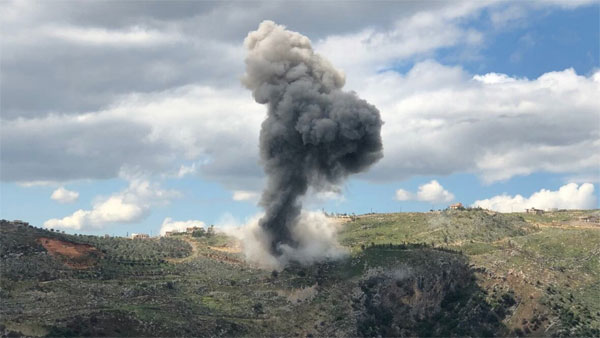Daijiworld Media Network - Beirut
Beirut, Sep 29: Tensions reignited along the Israel-Lebanon border on Sunday as Israeli warplanes launched fresh airstrikes on suspected Hezbollah targets in southern Lebanon, despite a ceasefire agreement brokered less than a year ago.
According to Lebanon's state-run National News Agency, multiple air-to-ground missile strikes struck areas near Kfar Remen and Al-Jarmaq, causing powerful explosions. In a parallel attack, an Israeli drone targeted a residential house in Houmine al-Fawqa, near Nabatieh, while other drones were spotted flying low over several villages, raising fears of further escalations.

Targeted Attacks on Hezbollah Infrastructure
Security sources cited by Xinhua News Agency confirmed that at least six air raids took place in a span of 15 minutes around Nabatieh. The locations hit were reportedly known Hezbollah positions, previously targeted in past confrontations. So far, no casualties have been officially reported.
The Israeli military claimed responsibility for the strikes, stating they targeted weapons depots used by Hezbollah for "advancing and executing terror operations" against Israel. Military spokesperson Avichay Adraee posted on social platform X, saying the presence of Hezbollah’s military infrastructure violates existing agreements and poses a direct threat to Israeli security.
Ceasefire Under Strain
These attacks mark a significant violation of the ceasefire negotiated by the United States and France in November 2024, which aimed to end 14 months of deadly cross-border clashes sparked by the Gaza war in October 2023.
The conflict between Israel and Hezbollah had escalated into full-scale military confrontation by September 2024, with over 4,000 people killed and more than 17,000 injured on both sides, mostly in Lebanon. The ceasefire agreement, though fragile, had largely held until recent weeks, with occasional skirmishes and violations reported.
Regional Tensions Remain High
Sunday’s flare-up is the latest sign of the fragile nature of the truce, amid growing concerns that the region could slide back into conflict. While Israel maintains that its strikes are preemptive and defensive, Hezbollah has repeatedly warned that any aggression will be met with retaliation.
With diplomatic channels still open but under pressure, both regional observers and international mediators are watching closely to see whether this incident is an isolated violation — or a harbinger of renewed conflict in a region already grappling with overlapping crises.
As of now, no official response from Hezbollah has been issued.